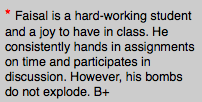Today in Slate, Timothy Noah asks, “Was the Times Square bomb the follow-on to 9/11 we’ve all been bracing for?” He’s not being funny, at least not on purpose. To Noah, Faisal Shahzad’s Nissan Pathfinder full of camping gas and fireworks, foiled by a t-shirt vendor when it smoked but did not explode, was the inevitable second strike. The enemy is  extraordinarily subtle. From a list of sketchy connections that includes Shahzad’s claim to have received bomb training in Waziristan* and the arrest of one of his associates at a mosque in Pakistan connected to Jaish-e-Mohammed—”the same al-Qaida affiliate that five young Muslim Americans from Alexandria, Va., contacted in Pakistan this past December”—Noah deduces a global network, presumably biding its time until it could accumulate enough fireworks. “It would appear that a second shoe has dropped,” he writes. Here’s a tip for young journalists hoping to remind America of the omnipresent threat of terrorism: don’t say “shoe.”
extraordinarily subtle. From a list of sketchy connections that includes Shahzad’s claim to have received bomb training in Waziristan* and the arrest of one of his associates at a mosque in Pakistan connected to Jaish-e-Mohammed—”the same al-Qaida affiliate that five young Muslim Americans from Alexandria, Va., contacted in Pakistan this past December”—Noah deduces a global network, presumably biding its time until it could accumulate enough fireworks. “It would appear that a second shoe has dropped,” he writes. Here’s a tip for young journalists hoping to remind America of the omnipresent threat of terrorism: don’t say “shoe.”
Meanwhile, as the subject of a federal manhunt whose addition to the no-fly list had been announced by the FBI 24 hours earlier, Faisal Shahzad got on a plane. They pulled him off before he could get to Dubai, but the whole thing was kind of unsettling. The idea that an alleged terrorist—whose name we know, and who is at that moment the primary focus of the entire Department of Homeland Security—could board an airplane just as easily as any other person who wants to blow up his shoe or light his genitals on fire cast the whole War on Terror into question. In the midst of our national sort-of-tragedy and sort-of-triumph, one has to ask: Are we good at this?
Since 2001, the United States has captured several terrorists who didn’t have plots yet and failed to stop a series of plots that didn’t work. Either the FBI is secretly capturing incredibly powerful terrorists and not telling us about it, or we’re performing the international law enforcement equivalent of busting dorm-room weed dealers. Surely, global terrorism is a real thing that poses a serious problem to America, but its manifestations in our lives since September 11 have been utterly absurd.
Noah argues that terrorism occurs in cycles, as relaxing attention to security provides openings for attacks that inspire renewed vigilance. “The previous ‘big’ foreign-terror incident in the United States before 9/11 was the World Trade Center car bombing in Feb. 1993,” he writes. “That’s eight years and seven months from peak to peak. The foiled Times Square attack occurred eight years and eight months after 9/11.” Also, Lincoln had a secretary named Faisal, and Faisal had a secretary named Lincoln.* ![]() Noah’s geopolitical kabbalism becomes doubly ridiculous when you consider that his list of the last three major terrorist attacks reads WTC bombing, 9/11, and unexploding car in Times Square. His sense of history is humiliated by his sense of events.
Noah’s geopolitical kabbalism becomes doubly ridiculous when you consider that his list of the last three major terrorist attacks reads WTC bombing, 9/11, and unexploding car in Times Square. His sense of history is humiliated by his sense of events.
So it is with all of us. The events of 9/11 were an awful tragedy, but the war between freedom and terror they ostensibly heralded has been largely the product of our imaginations. We’ve invaded two foreign countries and spent billions of dollars there and at home, and for what? Any misguided godmonger with two thousand dollars and American citizenship can put a bomb in Times Square, only to be foiled by his own ineptitude and historicized by our own paranoia. The rhetoric of global war and clash of cultures and they hate our freedom is not supported by events. The events are a collision of fear and randomness, laid over with furious attempts to make meaning. The events are absurd.
Yes, the underwear bombers and wanna-be terrorists turned away by Al Qaeda are absurd in the sense of ridiculous. But our attempt to integrate them into the increasingly abstract narrative of the War on Terror makes them absurd in the sense used by Camus. In regard to the individual, Camus asserted, the universe is utterly indifferent. It is a vast, nonsensical machine whose happenings occur with neither concern nor malice. Yet everything that happens happens to us, and from the individual perspective the blind, thoughtless universe is incredibly personal. That I was thinking about my ex girlfriend the morning she called me must mean something, because these events are my life. This conflict between the human desire for meaning and the essential meaningless of the non-human universe is the absurd.
A terrorist attack is absurdity in its most concentrated form. The attacker has no interest in his victims, other than that they be victimized. Yet for them, of course, it is intensely personal. The violence involved is fundamentally senseless, but the terrorist integrates it into a totalizing narrative of history, geopolitical power, and divine will. Those who are implicated in this narrative respond in kind, grappling with the horror of say, two jets flying into skyscrapers and killing thousands by, say, declaring themselves the leaders of an international crusade to ensure that things like that never happen again. Through all of this, for each of us, there is the sense that forces beyond our control or even understanding might leap from a parked car anywhere, at any time, and kill us.
As Faisal Shahzad demonstrated on Saturday, that’s pretty much true. As Camus demonstrated in The Myth of Sisyphus, however, we need to accept that we are responsible for making meaning out of the situation. So far, the meaning we have made has only reflected our hysterical craving for significance—both in ourselves and in events. The same impulse that wants to make Shahzad’s failed fireworks plot a comparable event to 9/11 has made our contemporary lives a titanic struggle between terrorism and whatever alternative we think we pose. Our rhetoric may preserve that narrative, but reality keeps insulting it.
The absurd saga of Faisal Shahzad has been a contest of mistakes that exposes the fundamental inadequacy of the War on Terror as a system for making meaning. The drama of the story can no longer sustain the actors’ performances. The heroes and the villains seem more suited to comedy, and the whole thing would be a farce were it not for the promise that someone will die at the end. Whatever we’ve been watching since 2001, we’re not seeing it correctly. Perhaps it is a theater on Monday afternoon, with stagehands and rats and administrators pursuing their business back and forth across the stage as the audience tries desperately to follow the plot.





Dan, I feel like you may have over-thought this one looking for something to talk about under the surface of the issue.